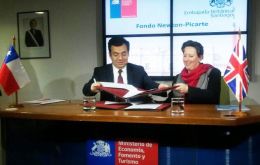MercoPress. South Atlantic News Agency
Health & Science
-
Saturday, August 16th 2014 - 11:49 UTC
Plenty of generic Viagra in Brazilian pharmacies as patent expires

The day after Pfizer Inc’s patent for Viagra expired in Brazil, Carlos Sanchez flooded pharmacies with his generic erectile dysfunction pills. It was a day his army of lawyers, researchers and marketers had been preparing for more than three years, even winning a bid to move up the patent’s expiration date.
-
Saturday, August 16th 2014 - 08:28 UTC
Ebola-affected region athletes involved in body contact disciplines banned from Youth Games

The International Olympic Committee (IOC) announced on Friday it was prohibiting young athletes from the Ebola-affected region of West Africa from participating in certain events at the Youth Olympic Games in Nanjing, China.
-
Friday, August 15th 2014 - 02:18 UTC
WHO downplays panic: air travel is low-risk for Ebola transmission

The World Health Organization reiterated its position that the risk of transmission of Ebola virus disease during air travel remains low. “Unlike infections such as influenza or tuberculosis, Ebola is not airborne,” says Dr Isabelle Nuttall, Director of WHO Global Capacity Alert and Response. “It can only be transmitted by direct contact with the body fluids of a person who is sick with the disease.”
-
Wednesday, August 13th 2014 - 06:41 UTC
Philip Morris prepared to sue the UK over plain packaging of cigarettes

Philip Morris International, the world's largest tobacco company, is prepared to sue the British government should it implement a law requiring plain packaging of cigarettes, a document showed.
-
Wednesday, August 13th 2014 - 06:29 UTC
First European Ebola infected dies; WHO approves unproven drugs for people at risk

Spanish priest Miguel Pajares, 75, the first European infected by a strain of Ebola that has killed more than 1,000 people in West Africa, has died in hospital in Madrid, a spokeswoman for the city's health authorities said.
-
Monday, August 11th 2014 - 01:28 UTC
Running seven minutes a day, helps keeps you ahead of cardiovascular diseases

A new study has found that every step counts – literally – towards reducing the risk of cardiovascular disease. Heart healthy exercise, moreover, need not be either time-consuming or tiring. Scientists at Iowa State University found that running for just seven minutes daily, even at slow speeds, could help reduce the risk of dying from heart disease by up to 50%.
-
Monday, August 11th 2014 - 01:24 UTC
A simple old remedy to help reduce the risk of developing some cancers

In what is being viewed as one of the most important discoveries in the battle against cancer, a major review of trials and studies has revealed that long-term use of low-dose aspirin reduces the risk of developing major cancers and dying from them by around one-third.
-
Saturday, August 9th 2014 - 06:38 UTC
Ebola outbreak becomes a “public health emergency of international concern”

World Health Organization declared on Friday that the Ebola outbreak spreading across West Africa has become a “public health emergency of international concern”. WHO also revealed that Ebola took an additional 29 lives between Tuesday and Wednesday alone.
-
Saturday, August 9th 2014 - 06:13 UTC
UK grants Chile matching funds for program on scientific research and innovation

The Newton-Picarte Fund for scientific research was officially launched in Chile on Thursday 31st July through the signing of the Memorandum of Understanding between the UK Government, represented by the British Ambassador Fiona Clouder, and the Chilean Ministry of Economy, Development and Tourism, represented by the Minister of Economy Luis Felipe Cespedes.
-
Wednesday, August 6th 2014 - 08:47 UTC
Caribbean Chikungunya cases over half a million, says PA health organization

The Pan American Health Organization (PAHO) says the number of new cases of the Chikungunya in the Caribbean increased by nearly 38,000 last week with the Dominican Republic having the most cases.